We speak with KraneShares’ CIO Brendan Ahern about the Holding Foreign Companies Accountable Act (HFCAA) and what impacts it poses to holders of Chinese ADRS. Our discussion explores the hurdles of de-listings, conversions, and the benefits and risks faced by U.S. and global investors, as well as China and Chinese companies.
Summary -Traders’ Insight Radio Ep. 8: U.S. Policy & Political Will – the De-listings of Chinese Equities
The following is a summary of a live audio recording and may contain errors in spelling or grammar. Although IBKR has edited for clarity no material changes have been made.
Steven Levine
Hello and welcome to IBKR Traders’ Insight Radio podcast. I’m Steven Levine, senior market analyst at Interactive Brokers, and I’ll be your host for today’s program, where we’ll be talking with Brendan Ahern, chief investment officer at KraneShares, about the impacts on, and potential consequences to, US and global investors, as well as China and Chinese companies, stemming from US policy – namely, the Holding Foreign Companies Accountable Act or HFCAA.
A little bit about Brendan … Brendan leads KraneShares’ research and education efforts. He actively works with investors on a wide range of subjects – from asset allocation to trading – to providing insights into the growing influence that index providers hold in the asset management industry. He’s also considered an expert in global financial markets with a particular focus on China. He’s also the author of China Last Night, a daily commentary on China’s financial markets, and we’re very lucky to have him here with us. Welcome, Brendan. How are you?
Brendan Ahern
I’m doing great Steven. Very much appreciate the opportunity to connect today.
Steven Levine
It’s really great to have you here. Thanks so much, and thanks so much for taking the time.
From what I understand the HFCAA was signed into law in late 2020, and about a year later the SEC adopted its final amendments for its implementation, and there’s been some mounting attention in the financial markets recently about changes that apparently need to take place for compliance reasons because of it.
More specifically, I understand this involves certain US-listed Chinese company equities that are on the cusp of being delisted from domestic exchanges, and I suppose depending on their eligibility, moved over onto the Hong Kong Stock Exchange. Some investors have now been converting their US-listed ADRs [American Depositary Receipts] – their Chinese ADRs – to local currency – to their secondary listings in Hong Kong – through their broker, and many have done this already here at IBKR.
I know you’ve been very active in speaking out about this HFCAA issue. What can you tell us about it?
Why did it come about? And how does it stand to affect these holders – whether it’s single name Chinese ADRs – I believe there’s a little more than 250 of these listed on US exchanges – or through ETFs [exchange-traded funds] and other funds.
Brendan Ahern
The history behind this goes back to the WorldCom and Enron crises in the early 2000s. We’re following those frauds in the US market. Sarbanes-Oxley passed and formed the PCAOB, Public Company Accounting Oversight Board, which was tasked with auditing auditors. So, the idea was that they were kind of the teacher of auditors. They would grade their papers. They would, literally – they received the audit papers, and over time, this law the PCAOB’s in charge of was applied to foreign listings.
And over the last 20 years, it’s been a slow process of countries allowing these audit reviews to take place, and over the last decade the SEC and its equivalent, the CSRC [The China Securities Regulatory Commission], signed an MOU – a memorandum of understanding – that they would allow this for US-listed Chinese companies, but it really, really has dragged on where over the last, say two to three years, Belgium and France and China have been the last to sign on. And today, it’s solely China does not allow these audit reviews. That’s really driven by a Chinese law that prevents the auditors from providing the audit papers.
And following the Luckin Coffee fraud, the US politicians took it upon themselves to force the issue.
So, Holding Foreign Companies Accountable Act was passed first in the Senate and then in the House and signed into law at the end of December 2020, which says that if these audit reviews aren’t allowed, then companies that don’t allow it would be delisted from US exchanges.
And so, you have over the last year the SEC kind of clarifying how they’re going to enforce this rule, and the whole situation is highly problematic. The companies were allowed to list here. I mean, US regulators allowed these companies fully aware they could not adhere to Sarbanes-Oxley. And in some ways the goal posts have been moved on the companies and their shareholders because they’re stuck between US law now and Chinese law. And so, the companies are in a really tough situation, and more importantly, their shareholders are in a very tough situation, because they’re stuck between the proverbial rock and the hard place on this issue.
Steven Levine
It’s really fascinating, and I wonder what it is hindering China, or what China’s decision is, not to comply, say with the PCAOB? What is driving that decision?
Brendan Ahern
I think one would be that across the US ADRs, you do have a small number of state-owned enterprises — companies that have a higher level of government ownership from China. And within those state-owned enterprises, it’s feasible that within these audit papers, you’d see the subsidies given to the companies. Now, the state-owned enterprises make up a very, very small percentage of the overall companies listed – numerically, as well as from a market cap [perspective]. The vast, vast majority of these companies are private companies. They have nothing to do with the Chinese government. So, on some of the earnings calls of the companies, the companies in speaking to this have said, ‘We have nothing to hide.
We would love to comply to this, but we can’t. We’re in China. We have to adhere to the Chinese law, but now there’s this U.S. law.’
The second factor is that this issue has been politicized. The regulatory bodies in the US and in China really are out of the equation in solving this issue – that US politicians said, ‘You’re going to do this.’ And I’ve got younger kids, and as a parent I can say no one likes to be told what to do. But certainly not a sovereign nation from another country telling them. That is culturally something that is unpalatable, I think, from a Chinese cultural perspective. That’s not how you operate in dealing with China politically or in business. I can speak to the latter. And it’s ultimately, Steven, the real problem is that this was done to punish China, but that’s an ill-founded view. Chinese investors do not hold the stock. US and global investors do, and you’re not hurting China if you delist them. You would hurt the investors – US and globally – that own those stocks.
Steven Levine
We’ll get to see how some of those stocks have performed a little bit later. It’s interesting that you mentioned Luckin Coffee and fraud and how this HFCAA may have come about on the heels of that.
I recall that political tensions, when you talk about political tensions, I recall the US government’s efforts to crack down on Chinese policy related to technology transfer, intellectual property, innovation … that they found, say, unreasonable or discriminatory, or that burdened or restricted US commerce. I seem to remember this affected Chinese tech stocks like Huawei, and later the US employed a section under, I think, the National Defense law – I think it was section 1237. It sought to essentially blacklist Chinese companies that the US deemed to have ties to Chinese military. This included Xiaomi at the time, and I believe it was under that same section led to the delistings of Chinese telecom companies from the New York Stock Exchange. Now, is HFCAA an extension of these US policies as well?
Brendan Ahern
It is totally different. There were executive orders in the waning days of the past and previous administration banning US investors from investing in companies that were reported to have ties to the Chinese military. As part of that ban, that became an issue for US exchanges, where three Chinese telecom companies – China Mobile, China Telecom, China Unicom – had ADRs listed on the exchange, and because that executive order was really pushed through in a very disorderly manner, in a very short time period, those stocks were delisted by the New York Stock Exchange, which made investors who either didn’t sell or convert their ADRs, ended up with a zero.
Now, HFCAA is different in that we have a little bit of a longer window. We’re talking about maybe a later 2024, maybe 2025, delisting. So, there’s time to prepare for this. But unfortunately for investors who, in the case of China Mobile, Unicom, and Telecom – if they did not act, that was a zero. And unfortunately, we’ve heard some really terrible stories about people whose parents were in the hospital, or a gentleman who was transferring his brokerage account from one broker to another … those positions are gone. That makes HFCAA a little bit scary in that if you don’t act, and this follows through, it’s gone. It’s a zero.
Steven Levine
Yes, by acting you mean converting these ADRs to local currency, secondary listings on the Hong Kong [Stock Exchange]. Now, are all of these ADRs eligible to be on this Hong Kong Stock Exchange?
Brendan Ahern
Well, we’ve seen over the last, two plus years … many of these companies start this relisting. It actually preceded HFCCA that Alibaba relisted in November of 2019. So, this was well in advance of HFCAA, and the reason Alibaba relisted in Hong Kong was because US investors treated Alibaba stock as like a trade war proxy. And so, Alibaba said, ‘Well, US investors don’t understand us, so we’re just going to go relist in Hong Kong where investors understand we have nothing to do with a trade war,’ and at the time Alibaba stock literally went from 200 to 300 – that investors in Asia said, ‘Yeah, you’ve got nothing to do with it.’
So, that started down a path of other companies relisting – that you had JD and NetEase relist in June of 2020, again way in advance of HFCAA. You then had Yum China, but that relisting has really accelerated because of HFCAA; and something that we anticipate across 2022 is for virtually all of these companies to relist.
And Steven, it’s worth noting that the companies in many cases have moved their treasury stock out of the US ADR into the Hong Kong share class. So, if you’re the founder and CEO, like in many of the cases of these companies, they’re moving their shares, which means they actually view this as a risk. And I think that’s something that for us, for KraneShares, we’ve started this migration process within our exchange-trading funds – most prominently KWEB, our China Internet ETF, where we’ve moved a third of our Alibaba, JD, NetEase, and Bilibili positions into Hong Kong, and we anticipate that migration to move further across this year, as well as other names that have relisted in Hong Kong: Baozun, Weibo relisted recently, Autohome, Trip.com … yeah, yeah, they’re moving.
Steven Levine
It sounds like they’re really getting ahead of it. It’s interesting you’re bringing up risk, and I know with Chinese ADRs, or really with any ADR, you have a foreign currency risk. It’s an implied foreign currency risk. It’s almost like an equity derivative in that sense where the US dollar – the dollar value of the ADR –
is really going to fluctuate with the underlying currency.
If you move these to local currency shares, I suppose that particular risk is taken out of the equation, which would be one less risk to consider, I suppose, among others that deal with ADR’s. But there’s also this idea that the Federal Reserve is now becoming a little bit more hawkish in terms of its policy of removing liquidity, of being less accommodative, of hiking rates in a rising inflationary environment. But the People’s Bank of China, the Chinese central bank, seems to be becoming more accommodative. It seems to be going in the opposite direction. I understand they’re coming under more scrutiny by Beijing. We used to have ‘the Fed put’, now I hear talk in the markets of a ‘Beijing put’. I find that very interesting. So, with these diverging monetary policies with the Fed and the People’s Bank of China, do you think that, given that, it adds back a layer of foreign currency risk for those holders of the local market shares in Hong Kong?
Brendan Ahern
Yeah, yeah, it’s a great observation, Steven. One underappreciated element of Hong Kong is that the Hong Kong dollar Is pegged to the US dollar. Now, it’s not a one-for-one peg. It’s allowed to float within a range, but the Hong Kong Monetary Authority does defend the peg. So, in general, Hong Kong-listed stocks, similar to, say, Saudi Arabia, which has a similar peg – in this stronger dollar environment, the almost irony is that the Hong Kong-listed securities have a measure of margin of safety relative to other EM [emerging market] currencies – that the currencies flowed – and as the Fed moves to a higher interest rate, a tightening cycle, that can be problematic for EM currencies, and obviously you’ve seen that: over the last year with, say, Turkey.
Now, you bring up another good point, which is interesting, that as the US is moving to a tightening –
China – the PBOC – is actually doing the opposite. Last July, the bank reserve requirement ratio – the amount of money banks have to hold on their books – was cut by 50 basis points, and that frees up balance sheet to lend more. Then, in December, we had the one-year loan prime rate cut. That was followed more recently by the medium-term loan facility, kind of an intra-PBOC – the bank lending facility – that was cut. And then even more recently, in January, we had the one— and five-year loan prime rates cut.
So, it’s interesting that China has kept its interest rates quite high over the last several years – they actually haven’t cut their interest rates in years and years. And so, they’ve got this dry powder that they’re starting to put into work, and I think that’s mainly driven by the real engine of GDP in China – it’s been export-driven manufacturing – that global stimulus has led consumers, globally, to buy more iPhones and TV’s and laptops and computers and Sony PlayStations and cars.
Now, for China as the world factory, that puts tremendous demand on their exports. Now, as the US and others move away from those stimulus policies, that export growth engine will inevitably slow. So, China has got to make up for it elsewhere in their economy. So, they’re easing, and I think the consumption trends in China have been relatively weak over the last year because of their very draconian COVID measures. And they’ve got to get those households away from that conservative [stance] to start spending more.
Steven Levine
It’s really fascinating, and we’ve seen what the equity market in the US has done, or how it’s performed, over the span of accommodative monetary policy in the US. It would be interesting to see how that plays out in China, as the PBOC may become even more accommodative than it has more recently –which brings me to this point, which I think is really interesting, because Chinese company shares haven’t responded really well, at least since the HFCAA had been rolled out. And I know you talked about how Alibaba shares had increased relisting in Hong Kong, but it seems the ADRs, at least in the past year, shares in Alibaba, JD.com which you mentioned, Baidu, Tencent … they’ve lost in the area of between 40-60% of their value from their 52-week highs in that time period.
But I also understand that there are certain related funds whose assets have actually increased –
their assets under management. So, it seems that there’s more inflows into related funds, even as these companies’ shares decline. How do you explain this?
Brendan Ahern
You know, 2021 was really the perfect storm for US-listed China ADRs, and just using our KWEB, which from the low in 2019 through mid-February of 2021, KWEB went up like 170%. And then from that, we lost almost 50% over the calendar year 2021. And it was driven by – first, we had Archegos, this US-listed hedge fund that five of the 10 securities they’d held were US-listed Chinese ADRs that were liquidated at very, very steep discounts. We then had the onset of Chinese Internet regulation, which has really weighed on the space. It feels like they’re walking down a list of companies almost like an ad hoc or whack-a-mole … but the reality is that the regulation is multifaceted, and those different regulatory silos like user data, user protection, fintech, anti-monopoly, anticompetitive … those different regulatory buckets are actually governed by different regulatory bodies in China that are, [and] have been, moving at different speeds.
And so, as different regulatory agencies come out with regulation across last year, we kind of view China as this singular entity, but that’s not really the case. And then in the fall, as the SEC, which is really simply just the enforcement agent for HFCAA, they have to enforce this law.
They’ve started to articulate how they’ll go about it, which I think really exacerbated tax-loss selling in November and December in the securities that we’ve seen prominent – if it’s Elon Musk or Mark Zuckerberg – if you’re generating big gains, you’re going to look for losses to offset those gains. And so, that’s investors saying, ‘Ok, I can maybe harvest a loss in an individual China ADR to offset gains elsewhere.’
But, I think it’s also elements of investors who don’t want to hold a Hong Kong share class. Not all US broker-dealers allow an ADR conversion like Interactive [Brokers] does.
Steven Levine
Yeah, that makes a lot of sense to me. That’s really interesting. Can you tell me what would you say to these holders in terms of strategy for hedging purposes? So, they’re holding the ADR – they’re going to convert – they want to make sure that they don’t suffer any losses in the meantime. What would you suggest in terms of a hedging strategy, or do they need one?
Brendan Ahern
I think ultimately, for any equity investor, we are taking risk, and these securities are classified as emerging markets, which tends to have a standard deviation, a minimum of twice that of the S&P 500. So, we have to think about ownership as within a volatility matrix – that we can be big believers in a company in the opportunity set, but we have to recognize these swings – to the upside and to the downside – can be significant.
I think as things migrate to Hong Kong, I’ve noticed that the Hong Kong names are not nearly as volatile as the US names, in my opinion. I haven’t proven this quantitatively, but I do think that in Asia the Western media narrative about China…. It’s not that investors aren’t aware of that negative narrative, they just don’t buy into it.
I think about Evergrande. In the US or Western media, it’s China’s Lehman moment. And in China, no one believes Evergrande’s going to default. It’s just too big to fail. I mean, I don’t think Evergrande exists in three to five years – it will be unwound, broken up. But an outright default? No. No. It’s not just that there’s 120 banks that have lent money to Evergrande, it’s Chinese households have paid for an apartment Evergrande is building, and default means they get left holding the bag. That’s not going to happen, so it’s highly unlikely.
Steven Levine
…won’t play out like the real estate crisis, or the housing crisis, here in the US. Although that seems to have been a phenomenon of mispricing in credit, I think, in general. But in this case, we have a huge company, a huge lender, where the real estate market is very much tied to that particular company and that particular company defaulting. The government, you’re saying, won’t allow this company to default because it’s too big to fail in their eyes?
Brendan Ahern
Yeah, I mean, you can never say never, but I would say in Chinese financial media, there’s little to no belief that Evergrande will have an outright default. There’s just too many Chinese households – because it’s a national-sized company – you’ve got people all over China paid for an apartment. They want that apartment. And then think about all of the construction companies working on Evergrande’s projects – that electrician, that plumber, the person running the cement mixer – they want to get paid.
Steven Levine
…and all the raw materials and all the investors in those raw materials as well, that goes into it, right?
I mean, there are a lot of parts to it.
Brendan Ahern
Steven, 100%. You have a downstream effect, and that’s not even— Who do they owe this 300 billion to? It’s Chinese banks. So, in general, Evergrande will pay for its sins, 100%, but I don’t see an outright default taking place.
Steven Levine
This is great, and I’m sure that’s great news for the banks as well to hear that, and to hear you say that. I’m going to wrap this up a bit here Brendan, but I’d like to hear your insights on what you foresee for US-China relations going forward as a result of the HFCAA, and what we started this conversation with. Will these de-listings, do you think, pose further risks for the markets in the US, and financial markets globally? Does it splinter out from here?
Brendan Ahern
Yeah, it’s – A) I think it’s misguided that this hurts China – that it hurts US investors. Secondarily, this is capital controls, and capital controls for political purposes is a very slippery slope. It sets a very dangerous precedent and puts US capital markets at risk for global investors. They would say, ‘Look what happened to China. That can happen elsewhere.’
But I do think this issue is solvable – that despite the rocky political relationship between the US and China, this is not a hard one. This is solvable. And hopefully, there are discussions taking place to solve this issue. Unfortunately, it’s taken the US a year to assign an ambassador to China, so you got to have dialogue and communication. I mean, get on an airplane. It’s 2022. You’re not sending a telex or a fax. This isn’t like Carthage versus Athens or Rome, Athens versus Sparta, or Rome versus Carthage. It’s 2022, get on an airplane.
Steven Levine
… and you’re talking about political will, and that’s really what it sounds like it comes down to in terms of resolving this issue. But this was truly fascinating, Brendan. Thank you very, very much for taking the time to do this.
You can learn more about this topic, for our listeners, in KraneShares’ webinar presentation US to Hong Kong Stock Conversion. It can be found on KraneShares’ website. You can also keep abreast of KraneShares’ webinars at ibkrwebinars.com, as well as their market commentary at IBKR Traders’ Insight at tradersinsight.news.
And I hope you’ll be back with us again, Brendan.
Brendan Ahern
Yeah, would love to Steven. Thank you very much.
For your listeners, as a fiduciary, we’re not going to stand idle on behalf of our shareholders, and at the same time we feel it’s an obligation to make investors aware of this risk. And I commend Interactive Brokers for providing a venue to allow for this ADR conversion – not all US broker-dealers allow that – so a hat-tip to Interactive Brokers.
Steven Levine
Thanks again, Brendan. I really appreciate it, and until next time, I’m Steven Levine with Interactive Brokers.
Disclosure: Interactive Brokers
The analysis in this material is provided for information only and is not and should not be construed as an offer to sell or the solicitation of an offer to buy any security. To the extent that this material discusses general market activity, industry or sector trends or other broad-based economic or political conditions, it should not be construed as research or investment advice. To the extent that it includes references to specific securities, commodities, currencies, or other instruments, those references do not constitute a recommendation by IBKR to buy, sell or hold such investments. This material does not and is not intended to take into account the particular financial conditions, investment objectives or requirements of individual customers. Before acting on this material, you should consider whether it is suitable for your particular circumstances and, as necessary, seek professional advice.
The views and opinions expressed herein are those of the author and do not necessarily reflect the views of Interactive Brokers, its affiliates, or its employees.

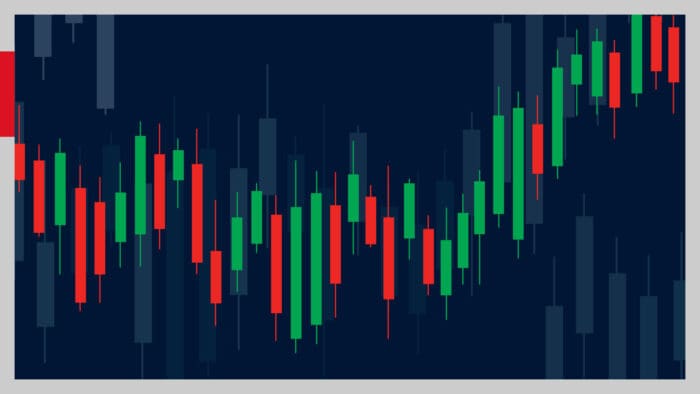




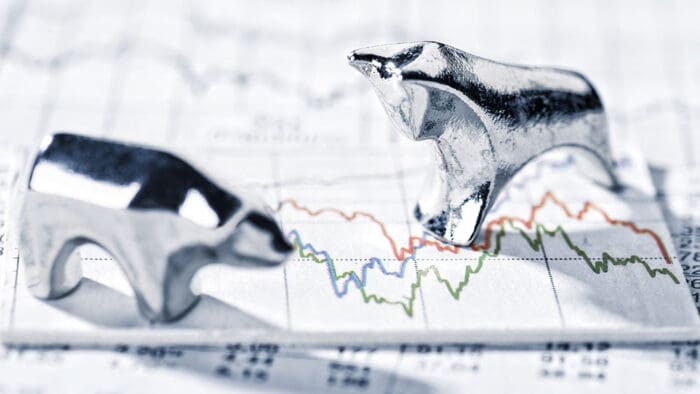

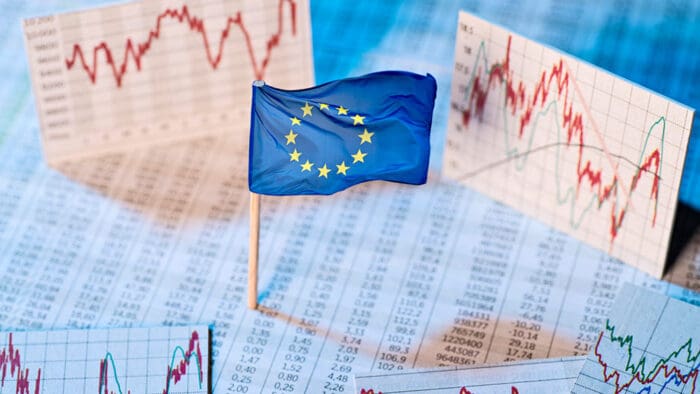
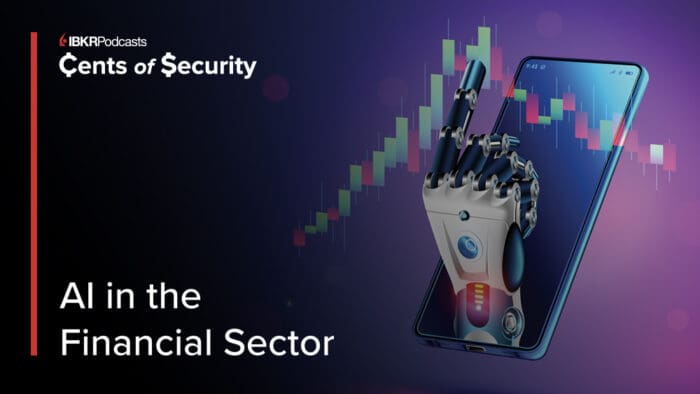




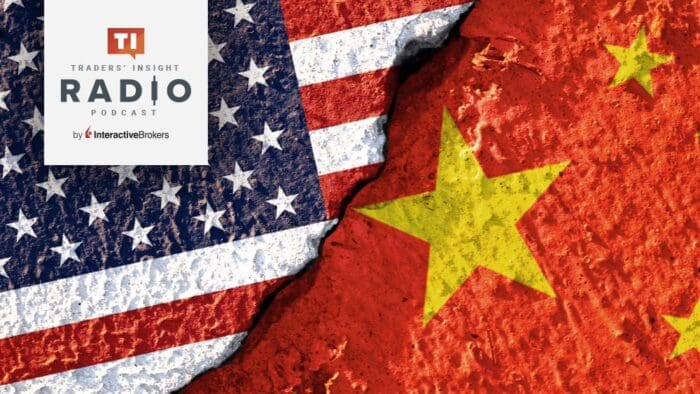



Join The Conversation
If you have a general question, it may already be covered in our FAQs. If you have an account-specific question or concern, please reach out to Client Services.